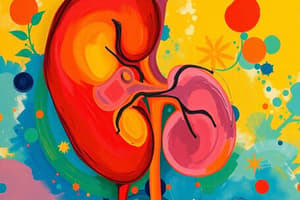Podcast
Questions and Answers
Which of the following electrolytes is primarily responsible for maintaining fluid balance and nerve function?
Which of the following electrolytes is primarily responsible for maintaining fluid balance and nerve function?
- Sodium (Na+) (correct)
- Potassium (K+)
- Magnesium (Mg2+)
- Calcium (Ca2+)
Which of these is NOT a key component of fluid balance?
Which of these is NOT a key component of fluid balance?
- Water
- Acids/Bases
- Glucose (correct)
- Electrolytes
What is the primary function of the kidneys in relation to fluid balance?
What is the primary function of the kidneys in relation to fluid balance?
- Control fluid output through urine production (correct)
- Produce hormones that regulate fluid intake
- Store excess fluid for later use
- Filter out electrolytes from the blood
Which hormone directly influences water reabsorption in the kidneys?
Which hormone directly influences water reabsorption in the kidneys?
Which of the following is NOT a direct consequence of electrolyte imbalance?
Which of the following is NOT a direct consequence of electrolyte imbalance?
Which of these is NOT a buffering system involved in maintaining acid-base balance?
Which of these is NOT a buffering system involved in maintaining acid-base balance?
What is the likely cause of respiratory acidosis?
What is the likely cause of respiratory acidosis?
Which of the following scenarios could lead to metabolic acidosis?
Which of the following scenarios could lead to metabolic acidosis?
What condition is characterized by an increase in blood pH?
What condition is characterized by an increase in blood pH?
What causes respiratory alkalosis?
What causes respiratory alkalosis?
Which laboratory tests are essential for diagnosing acid-base imbalances?
Which laboratory tests are essential for diagnosing acid-base imbalances?
What defines metabolic acidosis?
What defines metabolic acidosis?
In what clinical settings is it important to manage fluid, electrolyte, and acid-base balance?
In what clinical settings is it important to manage fluid, electrolyte, and acid-base balance?
Flashcards
Metabolic Acidosis
Metabolic Acidosis
A condition involving excessive acid production or loss of bicarbonate.
Respiratory Alkalosis
Respiratory Alkalosis
A condition caused by hyperventilation, leading to decreased blood CO2.
Metabolic Alkalosis
Metabolic Alkalosis
A condition characterized by the excessive loss of hydrogen ions or gain of bicarbonate.
Clinical Significance of Acid-Base Balance
Clinical Significance of Acid-Base Balance
Signup and view all the flashcards
Laboratory Tests for Imbalances
Laboratory Tests for Imbalances
Signup and view all the flashcards
Fluid Balance
Fluid Balance
Signup and view all the flashcards
Key Components of Fluid Balance
Key Components of Fluid Balance
Signup and view all the flashcards
Role of Kidneys in Fluid Balance
Role of Kidneys in Fluid Balance
Signup and view all the flashcards
Antidiuretic Hormone (ADH)
Antidiuretic Hormone (ADH)
Signup and view all the flashcards
Electrolytes
Electrolytes
Signup and view all the flashcards
Major Electrolytes
Major Electrolytes
Signup and view all the flashcards
Acid-Base Balance
Acid-Base Balance
Signup and view all the flashcards
Acidosis
Acidosis
Signup and view all the flashcards
Study Notes
Fluid Balance
- Fluid balance is crucial for normal bodily function, involving fluid intake and output to maintain a dynamic equilibrium.
- Key components include water, electrolytes (sodium, potassium, calcium, chloride, magnesium), and acids/bases.
- Water is the largest component, distributed between intracellular and extracellular compartments.
- Kidney function controls fluid output via urine production.
- Antidiuretic hormone (ADH) influences water reabsorption in the kidneys.
- Fluid intake is influenced by thirst mechanisms and dietary intake.
Electrolyte Balance
- Electrolytes are minerals with charges, crucial for nerve impulse transmission, muscle contraction, and osmotic balance.
- Maintaining electrolyte balance requires proper intake and excretion.
- Major electrolytes include:
- Sodium (Na+) – vital for fluid balance and nerve function.
- Potassium (K+) – essential for muscle contraction and nerve transmission.
- Calcium (Ca2+) – crucial for bone health, muscle contraction, and blood clotting.
- Chloride (Cl-) – important for fluid balance and acid-base regulation.
- Magnesium (Mg2+) – involved in enzymatic reactions and nerve function.
- Imbalances in electrolytes lead to diverse clinical symptoms and complications.
Acid-Base Balance
- Acid-base balance regulates hydrogen ion (H+) concentration in body fluids, maintaining a stable pH (7.35-7.45) for optimal cellular function.
- Buffering systems maintain this balance, including:
- Bicarbonate buffer system
- Phosphate buffer system
- Protein buffer system
- Imbalances (acidosis/alkalosis) arise from:
- Respiratory issues (hyperventilation, hypoventilation)
- Metabolic issues (kidney disease, diabetes)
- Ingestion of acidic or alkaline substances.
- Identifying the cause and nature of acid-base imbalances is crucial for treatment.
- The body compensates for these imbalances via various mechanisms.
Acid-Base Imbalances- Overview
- Acidosis, a decreased blood pH, can be respiratory or metabolic.
- Respiratory acidosis results from elevated blood carbon dioxide (CO2) levels.
- Metabolic acidosis involves excessive acid production or bicarbonate loss.
- Alkalosis, an increased blood pH, can also be respiratory or metabolic.
- Respiratory alkalosis is typically due to hyperventilation, reducing CO2.
- Metabolic alkalosis involves excessive hydrogen ion loss or bicarbonate gain.
- Both acidosis and alkalosis, if untreated, have serious adverse effects.
Clinical Significance
- Understanding fluid, electrolyte, and acid-base balance is essential in clinical practice.
- Assessing and managing imbalances is critical in various settings:
- Critical care units
- Emergency departments
- Hospital wards
- Laboratory tests (electrolyte panels, arterial blood gases) are vital for diagnosis and monitoring imbalances.
Studying That Suits You
Use AI to generate personalized quizzes and flashcards to suit your learning preferences.




